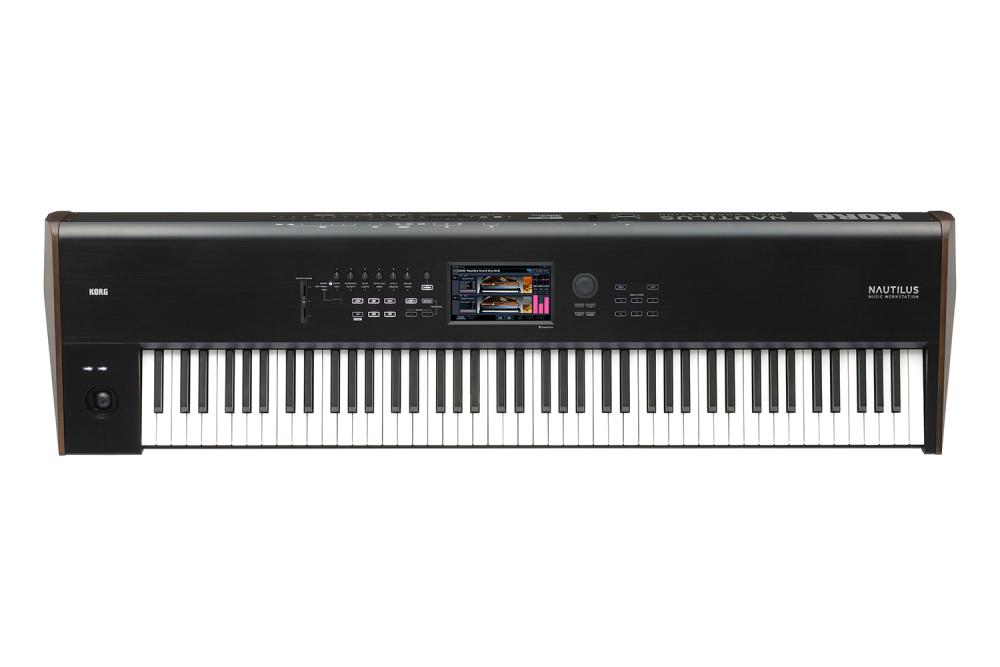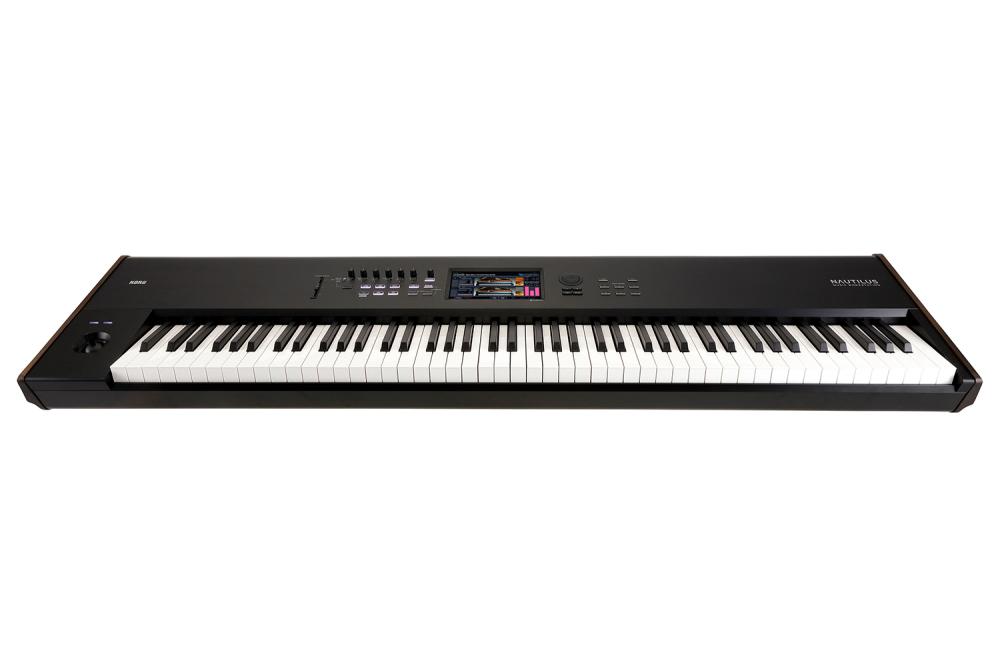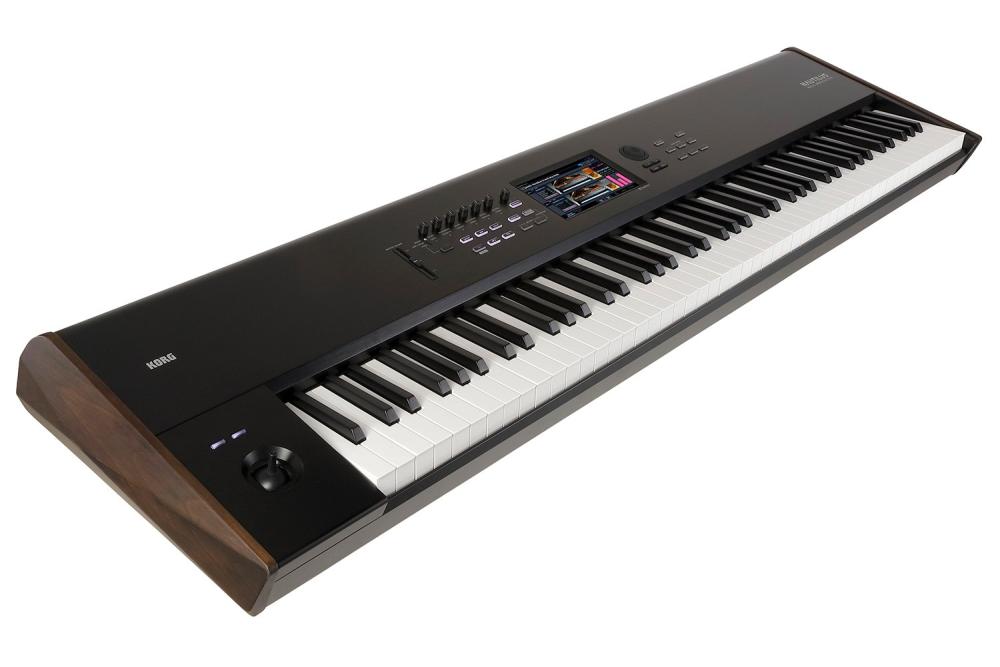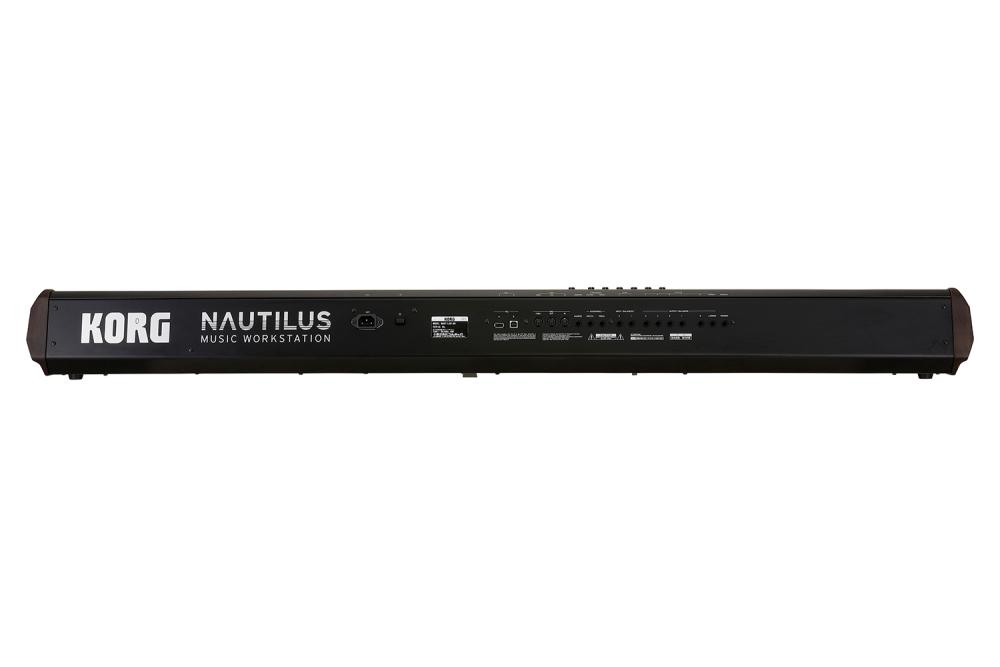Korg Nautilus 88
Lägg till en bevakning så meddelar vi dig så snart varan är i lager igen.
Korg Nautilus 88
The most dazzling and expansive collection of sounds ever put into a Korg synthesizer
Nautilus pushes the boundaries of what a performance synth and workstation is capable of. With the power of nine engines to drive a new approach to sounds, plentiful sampling, audio recording, effects, and processing power, there is simply no other synth that delivers more to explore sonically, with the workflow to get you there faster than ever. Korg spent years refining all our digital, analog, processing, and hardware technologies and delivering them in a way that helps the musician connect with their instrument. The result is the incredibly powerful, one-of-a-kind Nautilus.
Nine different sound engines offer massive expressive power
The Nautilus features nine dedicated sound engines to realistically reproduce sounds such as pianos, electric pianos, organs and more. To start, the enhanced SGX-2 piano sound generator offers delicate expressiveness to capture all the nuances of the acoustic piano, and Nautilus features the most piano libraries ever put into one product; with 12-step velocity-switched sound, string resonance and more. The EP-1 electric piano sound generator realistically reproduces seven different famous electric piano sounds. The CX-3 engine – the heart of our sought-after CX-3 reissue -covers the distinct sound of classic tonewheel organs. Add to that MOD-7 VPM/FM synthesis, the PolysixEX and MS-20EX for analog modeling, and the STR-1 for physical modeling, and you have essentially an engine for any type of sound you’re looking to get. Used together in Program or Combination mode, these distinctive engines create completely new timbres.
New sounds offered over three broad categories
The approach to the included sound on Nautilus, started with Korg setting aside our preconceptions of what sound should be like on a conventional music workstation, and instead focused on pushing the boundaries of sampling and programming to create a brand-new classifications of programs that we divide into three groups:
“Unique” sounds:
The Nautilus brings you distinctive sounds including phrase loops, prepared pianos, found percussion and more. Many seldom heard-of musical instruments found in different regions around the world can be difficult to play, but distinctive phrases played on these instruments are featured on the Nautilus. Use these phrases as-is in your songs—let your imagination be your guide. The Nautilus features sounds that were sampled for the first time just for this instrument, including prepared piano sounds created by placing different objects between piano strings and recording samples, or “found percussion” sounds made by turning ordinary items into instruments to be struck. Not only do these novel and mysterious sounds provide an unexpected flavor to your songs, they offer broad possibilities for sound effects used in film and TV music as well.
“Current” sounds:
The Nautilus also offers the freshest sounds that blend in well with today's music scene, including synths, drum kits, special effects and more. For synths, be sure to check out the EDM, electro and chiptune sounds for starters. Also, the Nautilus features more than 50 kinds of drum kits—sounds that most strongly reflect the changes in music over time. The special effect sounds offer useful material like drums added to dance music to create beats—sounds that you can put to use right away.
Standard sounds:
We’ve brought together all of the most important sounds a workstation needs including piano, electric piano, guitar, bass guitar and more, covering all genres. For the newly sampled piano sound, we’ve also recorded the lovely sonic ambience of the studio, and you can mix the piano and ambience sound as you like with the new ambience sound. A new electric piano model with a characteristic thick sound has been added, which works great for funky playing styles. We’ve also added many phrases that let you play back actual performances of guitar and bass parts that keyboardists will find useful.
The Dynamics knob makes delicate expression possible
With the Dynamics knob, you can instantly control the changes in volume and tone in response to how hard you play the keyboard (velocity); and you can customize this knob in real time to match the keyboard playing feel required for each style and song. Even when playing the same sound, you can turn this knob to get the feeling of playing a completely different sound. By finding just the right setting for your playing style, you'll uncover even more of the possibilities that the Nautilus offers. When you activate the Dynamics knob and turn it to the left, the keyboard responds more softly to your playing, giving you a wide range of dynamics. This allows for delicate, expressive playing when accompanying a piano solo or vocals, which directly reflects the dynamics of your performance. On the other hand, turning the knob to the right gives a stronger, more flat dynamic response. This brings out the sound when you’re playing in a band or ensemble, which works best when performing with a more even feel.
Make intuitive changes to sounds with the Realtime knobs
The six RT (real-time) knobs at the top left of the panel give you direct control over changes to the Prog and Combi sounds. A variety of functions are assigned to each knob that lets you enjoy making changes to sounds, such as the filter cutoff and effect depth, the gate time, tempo and swing of the arpeggiator or drum track, the type of snare drum and more. In Combi mode, you can group timbres and control their levels with the knobs. Further, you can press these knobs into the panel to lock them in place, preventing them from being accidentally changed while you’re playing. For instance, you could use this to enable only the knobs you often use onstage and push the ones in that you do not need.
A user interface designed for easy operation
For the Nautilus, we have completely rethought the user interface, considering that panel controls tend to become denser as more functions are added. The interface of the Nautilus lets users find just the things they’re looking for once they understand the principles. The Mode button lets you see what you’ve selected in each mode on a single screen, from Prog and Combi to the set list, sampling, sequence and global modes. Each mode has tabs for each function, and the Page buttons offer more detailed editing with consistent operations. With the user-friendly navigation of the Nautilus, you can press the Mode button at any time to return to the start if you get lost. A dark mode is available for the display, using black as the primary color to reduce eye fatigue. Six quick access buttons are also available as shortcut buttons. The Nautilus further offers four templates as a continuation of the previous user-friendly features, which can be used to select modes like Prog and Combi, as transport buttons for sequencer playback and recording and so on. You can also select your own settings as you like. What’s more, you can freely assign functions you frequently use and save them in one of four sets.
Convenient arpeggiator and drum track functions
Four scenes of arpeggio patterns and drum track sets are made available that perfectly match each Prog and Combi preset sound. These are useful for switching between scenes while they’re played, for use when improvising during performance, or for expanding your vision when composing music starting from a sound.
Color TouchView Display
The nerve center of the Nautilus is Korg’s enormous eight-inch (800 x 480 pixel) WVGA color TouchView display. In addition to simply selecting a sound or choosing a parameter with the touch of a finger, the enhanced Touch-Drag ability allows more detailed control of parameter values. Interactive instruments and panel graphics provide the ability to do everything from adjusting the lid of a grand piano to connecting patch cable on a semi-modular synthesizer model. The TouchView display also hosts a convenient new Search Function, allowing you to search for (and preview) sounds based on their titles.
Set list mode that demonstrates its power in live performances
Nautilus can organize all of the resources you need to get through a song—or a set—using the Set List mode. Using the Set List mode, the TouchView display can host 16 color-coded touch-screen buttons; each one can instantly call up the appropriate Preset, Combination, or Sequence—regardless of mode! You can also select different button colors, such as when you want to change the colors within a song while playing live. This is a powerful feature for situations that require quick and accurate control. The Set List mode even adds a nine-band graphic EQ, allowing the overall tone to be tweaked to match the venue.
Open Sampling System
Using Korg’s Open Sampling System, Nautilus can quickly sample an external audio source, regardless of whether Nautilus is in the Program, Combination, or Sequencer modes. The Open Sampling Mode can even resample the performance of the Nautilus itself. The user sample bank, which extends the convenience of the EXs sample library to user samples, allows custom samples to be loaded and played, taking advantage of the gigantic SSD capacity. AIFF, WAV, SoundFont 2.0, and AKAI S1000/3000 format samples can be loaded into memory via USB memory. Additionally, you can use a USB Ethernet adapter to exchange large amounts of sample data with your computer at high speed. Instruments or samples that you've previously created on your PC can be used to construct a music production setup based on just the Nautilus itself.
16-Track MIDI Sequencer / 16-Track Audio Recorder
Nautilus features a sequencer/recording section that offers both 16 MIDI tracks plus 16 audio tracks; a great resource for putting together a dazzling performance or a brilliant production. MIDI sequencing makes it easy to capture ideas, inspiration, and pro-quality phrases using the Drum Track, or RPPR (Realtime Pattern Play/Recording) functions. The 16-track audio recorder simultaneously captures up to four tracks of 16-bit/24-bit uncompressed data at a sampling rate of 48 kHz. Play along with recorded tracks, add effects, and then resample the Nautilus itself and place the resampled WAV files directly in a track. When polishing your tracks, feel free to use mixer automation and editing functions such as copy, paste, and normalize to get the results you want.
16 Onboard Effect Processors
Nautilus provides 16 internal effects to add impact to your sonic creations. Each of the 12 Insert effects can be applied to individual or multiple timbres in a combination, or to individual or multiple tracks of the sequencer. In addition, two Master effects can be applied to sends 1/2, and two Total effects can be applied to all tracks at the final stage of the sound. A separate three-band EQ is provided for every timbre, for every sequencer track, and for every audio track for adjusting subtle tonal balances or for creatively modifying the overall sound.
USB / MIDI Host Ports Accommodate MIDI Control Surfaces
Any class-compliant USB-MIDI controller can be connected directly to the Nautilus. Assign functions to a Korg USB MIDI controller with pads (nanoPAD, nanoPAD2, padKONTROL) to play drum parts.
Smooth sound transitions that eliminate dropouts when changing sounds, regardless of the mode you're in
When you switch program sounds during a performance to get ready for the next section, or when you switch from Program mode to Combi mode, the sound that's currently being output is always given priority and its effects are maintained during the program change, ensuring a seamless transition with no dropouts. This function has also earned extremely high praise from pro musicians.
88-key model with piano touch, 73-key model with light touch and 61-key model available
The keyboard on the 88-key model of the Nautilus uses a four-stage real weighted hammer action made in Japan, called the RH-3. This action is heavier on the lower notes and lighter on the higher notes for superb playability. The 73-key model features a much-requested light-touch synth keyboard from C to C, as with the 61-key model. This key action lets you play organ parts with plenty of glissandos, as well as synth solos that take advantage of the keyboard’s wide range. The 88-key model is fitted with luxurious wooden side panels, and the 73-key and 61-key models a completely new design with impressive curves that rise from the bottom of the unit to the sides, patterned after the Nautilus’ namesakes: the Nautilus submarine and the cephalopod mollusk. All of these elements make the Nautilus a distinctive instrument onstage as well, brimming with personality.
Stand-alone and Plug-in Nautilus Editing Software
The Nautilus Editor and Nautilus Plug-In Editor allow you to edit your Nautilus from your computer while viewing large numbers of parameters simultaneously, or to use Nautilus in your DAW as if it were a software synthesizer. You can download the latest version of the Nautilus sound editor from the Korg website.
Free bundle of music software
The Nautilus comes with a diverse variety of music software from Izotope including “Ozone Elements” which lets you not only create songs but also master them using AI, “Skoove” which will help you improve your keyboard playing skills, as well as software synths from Korg and other brands. In other words, the moment you get your hands on this synthesizer you'll have a variety of tools to help you take your music to the next level.
Specifications:
- Keyboard: 88 key: RH3 (Real Weighted Hammer Action 3), A - C. Velocity sensitivity is supported, aftertouch is not supported.
- Synthesis Types: SGX-2, EP-1, HD-1, AL-1, CX-3, STR-1, MOD-7, MS-20EX, PolysixEX
- Maximum Polyphony*1*2:
- Preset PCM: RAM 496 MB / DISK 2.3G (ROM 1,771 Multisamples, 3,955 Drumsamples)
- PCM RAM Capacity: Approx. 2GB
- Outputs: 1/4” TRS Balanced L/MONO, R, Individual 1-4
- Headphones: 1/4” TRS
- USB-B output: 24-bit, Sample Rate: 48 kHz, 2 channels
- Inputs: 1/4” TRS Balanced audio Inputs 1 and 2
- USB-B input: 24-bit, Sample Rate: 48 kHz, 2 channels
- Control Inputs: Damper pedal (half damper supported), Assignable switch, Assignable pedal
- MIDI: In, Out, Thru
- USB A: For connection to external USB devices (QWERTY keyboards, MIDI controllers, ethernet adaptors, and storage)
- USB B: MIDI/audio interface, MIDI: 1 (16 channel) input / 1 (16 channel) output, Audio: 2 channel input / 2 channel output
- Hard Drive: 60 GB SSD (2.5”)
- Power Supply: AC power supply terminal, Power switch
- Dimensions: 1437 x 387 x 139 mm
- Weight: 23,1 kg
- Power Consumption: 40 W
- Included accessories: AC cord, Quick Start Guide
(For complete specifications, visit www.korg.com)
-
14 dagars öppet köp
-
Fri frakt vid köp över 800kr




